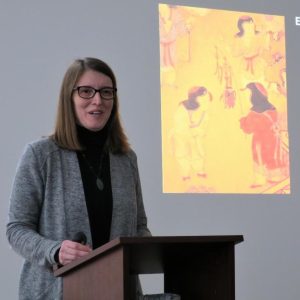
Dr. Susan Fernsebner, professor of history at the University of Mary Washington, spoke at DRBU on February 4, 2019 about her research on the neo-Confucian ideals of children’s education, specifically in the Tang dynasty text Mengqiu (蒙求). She introduced the author of this text, Li Han, whose detailed sayings and short stories offer exemplar figures for students to follow in areas of studiousness and filiality. The stories were intended for students to learn values adults sought to instill in them. Dr. Fernsebner later described the classical and modern interpretations of childhood play and their historical impacts and significance.
In her presentation, she presented a range of mother figures that were influential to their sons’ development within the Mengqiu. The story of Wang Lan and Wang Xiang presented two half-brothers that learned to maneuver their mother’s treatment. To her stepson, Wang Xiang, she was abusive and hateful. To Wang Lan, her biological son, she was the opposite. Despite this, Wang Lan helped Wang Xiang view and treat the mother compassionately. Wang Lan even helped Wang Xiang avoid being poisoned by the mother, maintaining a principle of kindness and filiality. The tale ends with describing how Wang Lan later became a honorable government official. The moral of the story illustrates that deep filiality should be maintained regardless of the qualities of the parents—additionally suggesting that virtue from the sons was somehow inherently possible even if the domestic environment did not teach this.
The quintessential mother figure in neo-Confucian texts, Mengzi’s mother, is described to extend extra care by teaching Mengzi to be diligent in his studies. Mengzi’s mother told him that if he neglected his studies, it would be as if she cut the loom thread, which would cause all of the woven threads to suddenly unravel, destroying all the work put in.
In a Q&A session following the presentation, audience members showed a deep interest in the stories of the mothers and their children. Some asked how these neo-Confucian tales would be understood in the modern context. Others asked whether some stories subtly suggest a cultural expectation of holding silence, which inherently passes down familial trauma.